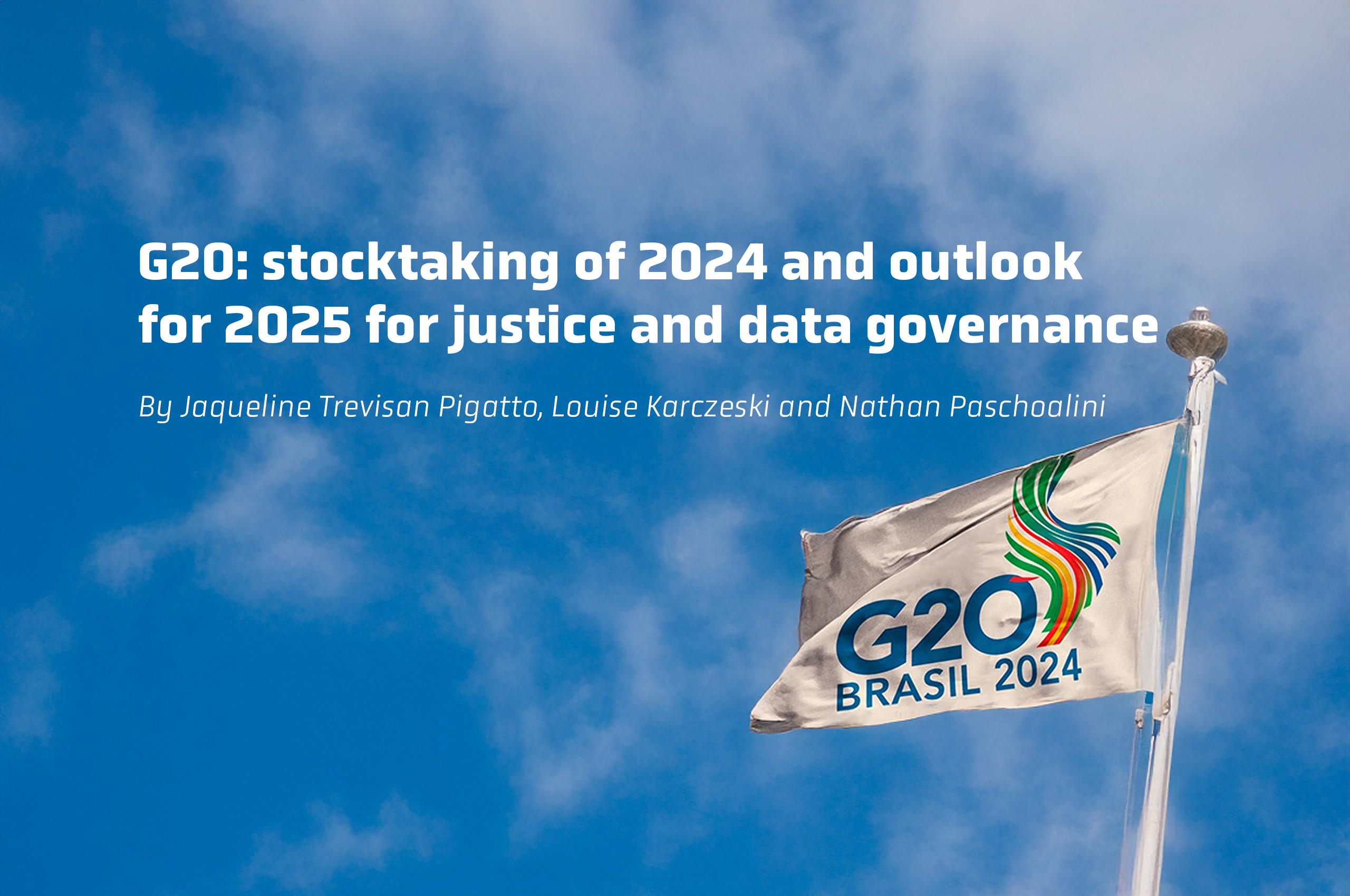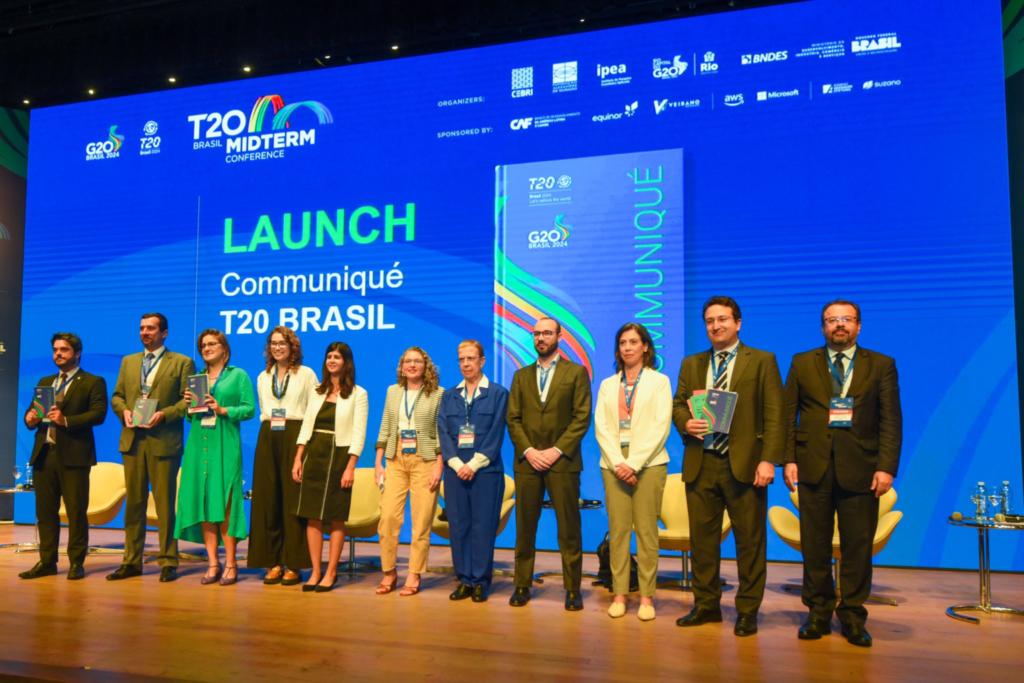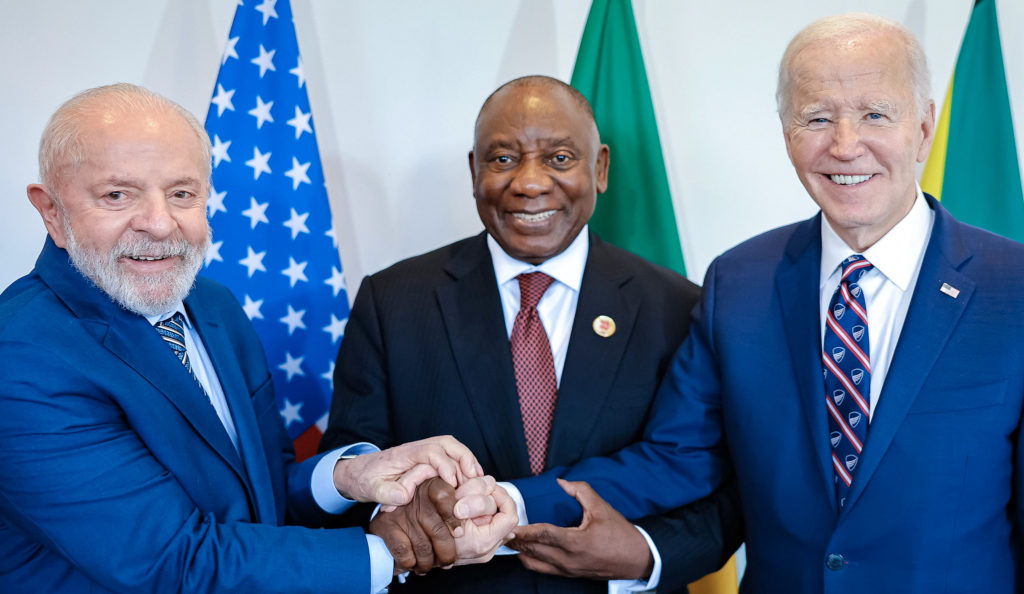Article | Data Privacy Brasil in the T20: Inclusive Digital Transformation | Governance and Regulation
G20: stocktaking of 2024 and outlook for 2025 for justice and data governance

By Jaqueline Trevisan Pigatto, Louise Karczeski and Nathan Paschoalini
In 2024, Data Privacy Brasil took on a new and exciting challenge: participating in the G20 ecosystem, during the Brazilian presidency, through the official engagement group for think tanks, Think 20 (T20). Historically seen as one of the most prestigious groups, T20 addresses the most diverse topics and presents political recommendations through the work of researchers worldwide – which also strengthens a large and rich network of experts from different areas and nationalities.
As lead co-chairs from one of the T20 task forces, Inclusive Digital Transformation, Data Privacy Brasil was able to not only lead a large team of experts on the agenda, but also bring together partners and experts that inspire us, especially from the Global South. The T20 Brazil Organizing Committee, formed by the Institute of Applied Economic Research (IPEA), the Alexandre de Gusmão Foundation (FUNAG) and the Brazilian Center for International Relations (CEBRI), kindly accepted our suggestions and were quite satisfied with the proposal of a task force diverse both geographically and as well as ethnically, which enriched the work. In addition to the selection of policy briefs, carried out during the first half of the year, the task force organized and participated in several events in Brazil and abroad, which debated the six work topics: i) meaningful connectivity; ii) platformization of public services; iii) data protection and cybersecurity; iv) decent work; v) artificial intelligence; and vi) regulation of digital platforms. Of these, four were also priorities for the Digital Economy Working Group on the Sherpa Track, which involves the state delegations of G20 members, which allowed for close dialogue and opportunities to present proposals and fruitful exchanges, especially with the Brazilian government.
Since the beginning of our activities in Task Force 5 (TF5), there has been an understanding of the collective nature of this work, so the TF5 concept note, a document that would guide all the Task Force’s activities throughout the Brazilian presidency, was created collaboratively in a process led by Data Privacy Brasil and which included the active participation of the coordinators and members of the tracks that made up the TF5.

One of the results of this collaborative process was the consensus around the need for the task force’s activities to be conducted using a data justice approach. It is a concept developed by Linnet Taylor, researcher at Tilburg University, who, in short, seeks to apply and reflect the notion of justice to the way data is produced, collected and used, paying special attention to the way in which subjects and social groups are made visible or invisible, represented and treated.
Thus, TF5’s work sought to establish and highlight the relationships between the development of an inclusive digital transformation and the theoretical framework of data justice. In this sense, the task force, during its year of activities, invested in an approach centered on human beings and the protection of rights, aiming to reduce information and power asymmetries between different subjects, social groups, and interested actors.
Based on the imperative of thinking about data governance and the development of emerging technologies through the lens of data justice, Task Force 5 produced a series of recommendations, included in the TF’s final declaration, which were submitted to the T20 Brazil Organizing Committee, so that they could be considered in the final statement (Communiqué) of this engagement group. Among the recommendations made, we highlight two: i) the first, deals with data governance and the creation of a forum called Data20 (D20); ii) the second concerns the topic of artificial intelligence.
The first recommendation arises from the recognition that data governance is a cross-cutting topic not only between the different G20 Social engagement groups, but also the different working groups that make up the G20 government track (Sherpa Track). In this sense, originally, TF5 proposed the creation of a policy forum for the transversal discussion of topics related to data governance, so that it would serve as a link between G20 Sherpa and G20 Social.
The second, in turn, deals with the need to establish governance and regulation mechanisms for artificial intelligence that are participatory and human-centered, aiming to reduce the risks and impacts that emerge from the implementation of these technologies on vulnerable social groups. In the context of this recommendation, the collective effort between four engagement groups stands out, namely Civil20 (C20), Labor20 (L20), Think20 (T20) and Women20 (W20) – representatives of civil society, trade unions, research centers and women –, in the development of a joint declaration on artificial intelligence, entitled São Luís Declaration. The declaration is named after the city of São Luís do Maranhão, which hosted the third meeting of the G20 Digital Economy Working Group and the “AI Summit: Bridging Boundaries“, a T20 event – organized by Data Privacy Brasil, CEWEB.br, CEBRI and Heinrich Böll Foundation – where the basis for the declaration was established.
This document uses an intersectional approach to deepen convergence and consensus on different topics related to the development and implementation of artificial intelligence, such as the guarantee of fundamental rights, the potential environmental impacts arising from the development of these systems, the protection of workers and labor rights, as well as recognizing the role of multistakeholder cooperation for inclusive digital transformation and AI governance. Also as an effort between engagement groups, before the São Luís Declaration, the T20 and C20 had already issued a joint statement on economic, environmental and digital topics, also addressing the issue of principles for AI, launched during the T20 Midterm Conference.
These themes, exhaustively addressed during the work of TF5, reverberated in the Rio de Janeiro Leaders’ Declaration, a document issued at the end of each G20 presidency and agreed upon by member states and regional unions throughout the working year. The Leaders’ Declaration dedicated a section to specifically address the topic of artificial intelligence, which recognizes the benefits of these emerging technologies, but also highlights the need to establish fair, participatory governance that takes into account the protection of human and fundamental rights, in addition to guaranteeing the dignity of work and workers. The Declaration also recognizes the role of data governance as a fundamental component for establishing governance mechanisms for AI.
In December 2024, as we close the G20 Brazil cycle, we also begin intensive monitoring of preparations and transition with the South African presidency. Through diplomacy and contacts with South Africa’s old and new partners, both from the third sector and government actors, we were able to convey the main messages of our task force and the results achieved with the Leaders Declaration, but emphasizing that the work needs advances and deeper debates, especially for data governance.

The creation of a specific Task Force for AI, which involves the topic of data governance, and also seeks to expand the dialogue for both the Sherpa and Finance Tracks, in addition to the participation of engagement groups, builds on the D20 proposal and the Declaration of São Luís, taking principled discussions to guidelines and concrete implementation actions.
Another novelty of the South African presidency appears in the issue note from the Digital Economy Working Group (DEWG): the use of the concept of data justice, brought for the first time within the G20 by our concept note from the T20 Brazil Inclusive Digital Transformation task force. The Task Force Final Statement brought the concept as a basis and result of several of its recommendations, with the intention that they seek to reduce asymmetries and inequalities based on the public interest in the use of data. The 2025 DEWG places the concept within two of its four priorities: Digital Public Infrastructures (DPIs), from the perspective of distributing opportunities based on DPI solutions; and Artificial Intelligence, addressing public interest through measures such as algorithmic transparency and access to information.
Data Privacy Brasil will continue to follow the G20 movements in South Africa and engage whenever possible with all interested parties, from engagement groups to the Sherpa and Finance Tracks. The G20 is, without a doubt, a forum of great importance for advancing the agendas of the Global South in a broad and multistakeholder dialogue, with the potential to place data at the center of sustainable development and fundamental rights policies, in line with multilateralism.
DataPrivacyBr Research | Content under licensing CC BY-SA 4.0
